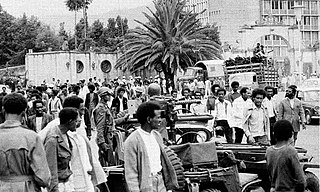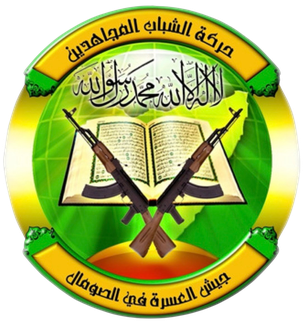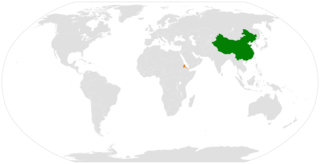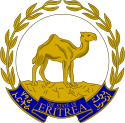
The economy of Eritrea has undergone extreme changes after the War of Independence. It experienced considerable growth in recent years, indicated by an improvement in gross domestic product in 2011 of 8.7 percent and in 2012 of 7.5% over 2011, and has a total of $8.090 billion as of 2020. However, worker remittances from abroad are estimated to account for 32 percent of gross domestic product.

The foreign relations of Eritrea are the policies of the Eritrean government by which it administers its external relations with other nations. Since its independence, Eritrea's foreign relations have been dominated by conflict and confrontation, both in the regional and international arenas. It has maintained often troubled, and usually violent, relations with its neighbors, including brief armed conflicts with Yemen and Djibouti and a destructive war with its bigger-neighbour, Ethiopia. At present, Eritrea has very tense relations with neighboring Ethiopia and Djibouti. Relations in the international arena also have been strained since the last decade, particularly with major powers. What appeared cordial relations with the US in the 1990s turned acrimonious following the border war with Ethiopia, 1998-2000. Although the two nations have a close working relationship regarding the ongoing war on terror, there has been a growing tension in other areas. Ties with international organizations such as the United Nations, the African Union, and the European Union have also been complicated in part because of Eritrea's outrage at their reluctance to force Ethiopia to accept a boundary commission ruling issued in 2002.

The Derg, officially the Provisional Military Administrative Council (PMAC), was the military dictatorship that ruled Ethiopia, then including present-day Eritrea, from 1974 to 1987, when the military leadership or junta formally "civilianized" the administration but stayed in power until 1991.

The People's Democratic Republic of Ethiopia was a socialist state that existed in Ethiopia and present-day Eritrea from 1987 to 1991.

The Eritrean–Ethiopian War, also known as the Badme War, was a major armed conflict between Ethiopia and Eritrea that took place from May 1998 to June 2000.

The Swiss Agency for Development and Cooperation (SDC) is an office-level agency in the federal administration of Switzerland, and a part of the Federal Department of Foreign Affairs. Together with other federal offices, SDC is responsible for overall coordination of Swiss international development activities and cooperation with Eastern Europe, as well as humanitarian aid.

After World War II, Ethiopia began to receive economic development aid from the more affluent Western countries. Originally the United Kingdom was the primary source of this aid, but they withdrew in 1952, to be replaced by the United States. Between 1950 and 1970, one source estimated that Ethiopia received almost US$600 million in aid, $211.9 million from the US, $100 million from the Soviet Union and $121 million from the World Bank. Sweden trained the Imperial Bodyguard and India at one point contributed the majority of foreign-born schoolteachers in the Ethiopian educational system.

The Ethiopian Civil War was a civil war in Ethiopia and present-day Eritrea, fought between the Ethiopian military junta known as the Derg and Ethiopian-Eritrean anti-government rebels from 12 September 1974 to 28 May 1991.

Harakat al-Shabaab al-Mujahideen, commonly known as al-Shabaab, is a Sunni Islamist military and political organization based in Somalia and active elsewhere in East Africa. It is actively involved in the ongoing Somali Civil War and incorporates elements of Somali nationalism into its Islamist cause. Allegiant to the militant pan-Islamist organization al-Qaeda since 2012, it has also been suspected of forging ties with al-Qaeda in the Islamic Maghreb, and al-Qaeda in the Arabian Peninsula.

Ethiopia–United States relations are bilateral relations between Ethiopia and the United States. Ethiopia is a strategic partner of the United States in the Global War on Terrorism. The United States is the largest donor to Ethiopia: in 2008 U.S. foreign aid to Ethiopia totaled US$969 million, in 2009 $916 million, with 2010 estimated at $513 million and $586 million requested for 2011. U.S. development assistance to Ethiopia is focused on reducing poverty and supporting economic development emphasizes economic, governance, and social sector policy reforms. Some military training funds, including training in such issues as the laws of war and observance of human rights, also are provided.

Eritrea, officially the State of Eritrea, is a country in the Horn of Africa region of Eastern Africa, with its capital and largest city at Asmara. It is bordered by Ethiopia in the south, Sudan in the west, and Djibouti in the southeast. The northeastern and eastern parts of Eritrea have an extensive coastline along the Red Sea. The nation has a total area of approximately 117,600 km2 (45,406 sq mi), and includes the Dahlak Archipelago and several of the Hanish Islands.

Ethiopia–Israel relations are foreign relations between Ethiopia and Israel. Both countries re-established diplomatic relations in 1992. Ethiopia has an embassy in Tel Aviv. Israel has an embassy in Addis Ababa. Israel has been one of Ethiopia's most reliable suppliers of military assistance, supporting different Ethiopian governments during the Eritrean War of Independence.

Canada–Ethiopia relations are foreign relations between Canada and Ethiopia. Both countries established diplomatic relations in 1956. Canada opened an embassy in Addis Ababa in 1957; although Ethiopia opened an embassy in Ottawa in 1962, it was closed the next year due to financial constraints and not re-opened until 1989. In 2021, Ethiopia closed its embassy in Ottawa again due to reshuffling and reorganization. In 2022, Ethiopia reopened its embassy in Ottawa.

China–Eritrea relations refers to the current and historical relationship between China and Eritrea. Eritrea gained independence from Ethiopia in 1993 and, as of 2007, relations between the two states registered "smooth growth".

Denmark–Eritrea relations refers to the current and historical relations between Denmark and Eritrea. Denmark is represented in Eritrea through its embassy in Nairobi, Kenya, and Eritrea is represented in Denmark through its embassy in Stockholm, Sweden.

The Ministry of Foreign Affairs of Eritrea is a government ministry which oversees the foreign relations of Eritrea. Eritrea's current minister of foreign affairs is Osman Saleh Mohammed, since 2007.

Denmark–Ethiopia relations refers to the current and historical relations between Denmark and Ethiopia. Denmark has an embassy in Addis Ababa, and Ethiopia is represented in Denmark through its embassy in London.

Corruption in Eritrea is a considered a deeply serious and growing problem. The level of corruption used to be considerably lower in Eritrea than in many other African countries. Indeed, it was traditionally viewed as having a “strong ‘anti-corruption’ culture” and considered relatively “egalitarian and corruption-free.” In 2006, a report by Bertelsmann Stiftung stated that corruption, as of that date, was not a serious problem within Eritrea. While noting that there had been “cases of corruption since independence,” they existed on a negligible level, although politically-motivated corruption allegations have been made. But, in fact, corruption is said to have been growing steadily worse ever since 1998, when, not long after the end of its decades-long war of independence, a border conflict with Ethiopia led to another war.

Eritrea–India relations refers to the international relations that exist between Eritrea and India. Eritrea maintains an embassy in New Delhi. India maintains an embassy in Asmara since 2021. Previously, India was represented to Eritrea through its High Commission in Khartoum, Sudan.
Indian foreign aid is the aid given by the Indian government to other governments. India's major quantum of foreign aid is given to neighbouring countries. According to India's budget in 2021–22, its direct overseas aid stood at ₹18,154 crore (US$2.3 billion). That apart, India also extended a direct line of credit worth $30.66 billion to several foreign countries for developmental projects. The way of providing a much larger share of aid in the form of concessional loans is quite similar to that of China. India has set up 'Indian Agency for Partnership in Development' as a part of Ministry of External Affairs (India) to channelize aid to recipient nations.

















